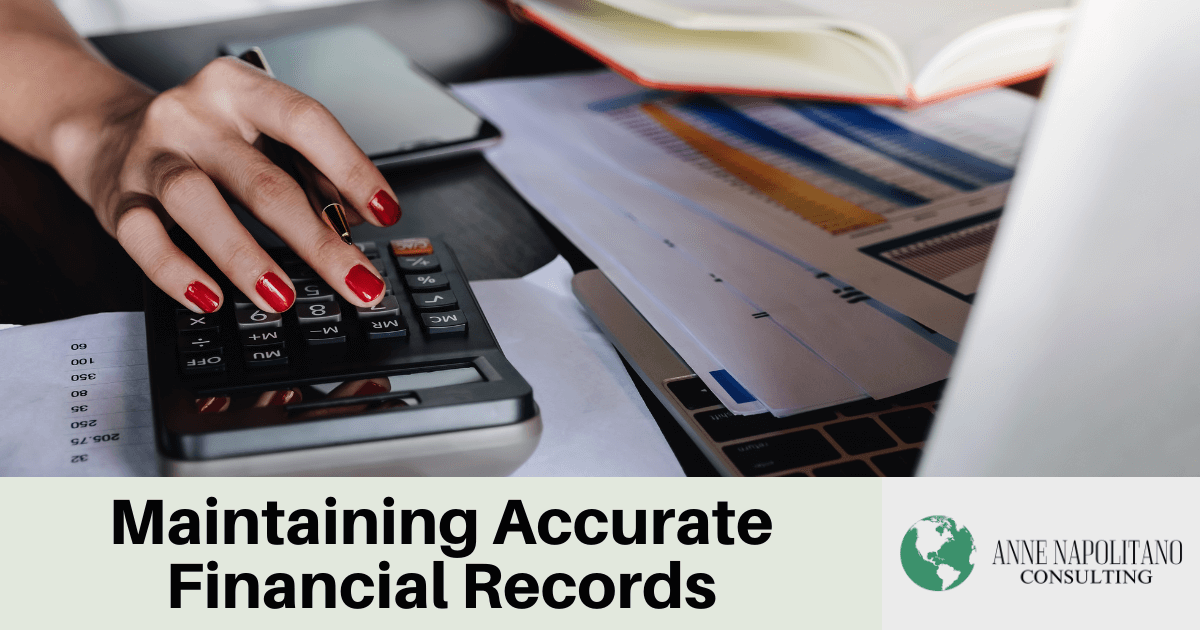
Maintaining accurate financial records is the backbone of any successful business. They help provide you with a clear understanding of your company’s financial health and performance, which is essential for decision-making, financial planning, and regulatory compliance. Inaccurate financial records, on the other hand, can lead to disastrous consequences, including loss of reputation, legal issues, and financial losses.
When it comes to accounting best practices, maintaining accurate financial records is one of the most critical to the success of any business.
Why Maintaining Accurate Financial Records Matters
Accurate financial records serve several purposes. First, they provide a snapshot of your company’s financial health and performance. This information is essential for decision-making, including identifying areas for improvement, forecasting future revenue, and managing cash flow. Accurate financial records also help your business comply with legal and regulatory requirements, such as tax reporting and auditing. For example, maintaining accurate financial records is an especially important component of restaurant financial management to help ensure compliance with restaurant sales tax laws. Additionally, accurate records provide transparency for investors, creditors, and stakeholders, which can affect your company’s reputation and ability to secure financing.
Best Practices for Maintaining Accurate Financial Records
Here are four best practices for maintaining accurate financial records for your business.
1. Set up a Chart of Accounts
A chart of accounts is a standardized list of all the accounts used in a company’s financial transactions. It provides a structure for organizing financial data and ensures consistency in reporting. The chart of accounts should include all the accounts used by your business to record financial transactions, such as revenue, expenses, assets, liabilities, and equity.
The chart of accounts should be tailored to your business’s specific needs and industry. A well-organized chart of accounts allows you to track your business’s finances accurately, report financial statements in a standardized format, and easily monitor financial performance. It also simplifies the tax preparation process, making it easier to identify deductible expenses and calculate taxes owed.
2. Reconcile Accounts
Reconciling accounts involves comparing financial records to external sources, such as bank statements, to ensure accuracy. This process helps identify errors, discrepancies, and fraudulent activities. It’s essential to reconcile accounts regularly, preferably monthly, to catch errors early.
The reconciliation process involves comparing the balances in your company’s financial records to the corresponding balances in external sources, such as bank statements, credit card statements, and vendor invoices. Any discrepancies should be investigated and resolved promptly. The reconciliation process helps ensure that your financial records are accurate and complete, reducing the risk of errors and fraudulent activities. It also provides you with a clear understanding of your business’s cash position, which is essential for managing cash flow and making informed financial decisions.
3. Keep Records Up to Date
Keeping financial records up to date is critical for accuracy. It’s essential to record transactions promptly and regularly, preferably daily. Delaying recording transactions can lead to confusion, errors, and omissions. Your business should maintain a system for organizing and storing financial records, such as invoices, receipts, and bank statements, to ensure easy access and retrieval.
The record-keeping process should be standardized and consistent to ensure accuracy and completeness. Financial records should be organized by account and date, making it easier to track transactions and identify errors. Keeping financial records up to date also reduces the risk of fraud by providing a clear audit trail of financial transactions.
4. Use Accounting Software
Using accounting software reduces the risk of errors and increases efficiency by automating manual processes, such as data entry and reconciliation. Accounting software also provides real-time access to financial data, making it easier to monitor performance and identify issues.
You should choose accounting software based on your business’s needs, size, and industry. The software should integrate with your other business systems, such as payroll and inventory management, to provide a comprehensive view of your business’s financial health. Using the right accounting software will give your business the tools you need to manage your finances effectively, including generating financial statements, tracking expenses, and managing cash flow.
Partners in Your Success
Maintaining accurate financial records is a crucial accounting best practice for any business’s success. Accurate financial records help reveal your company’s financial health and performance, ensure compliance with legal and regulatory requirements, and enhance transparency.
If you need assistance setting up a chart of accounts, reconciling accounts, keeping records up to date, and using accounting software to maintain your financial records, we’re here to help. Schedule your free consultation with Anne Napolitano Consulting today. We want to be partners in your success.
